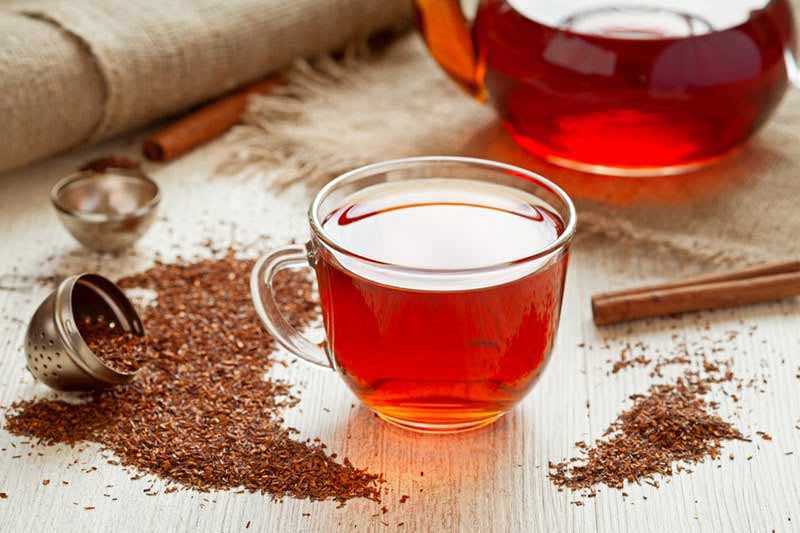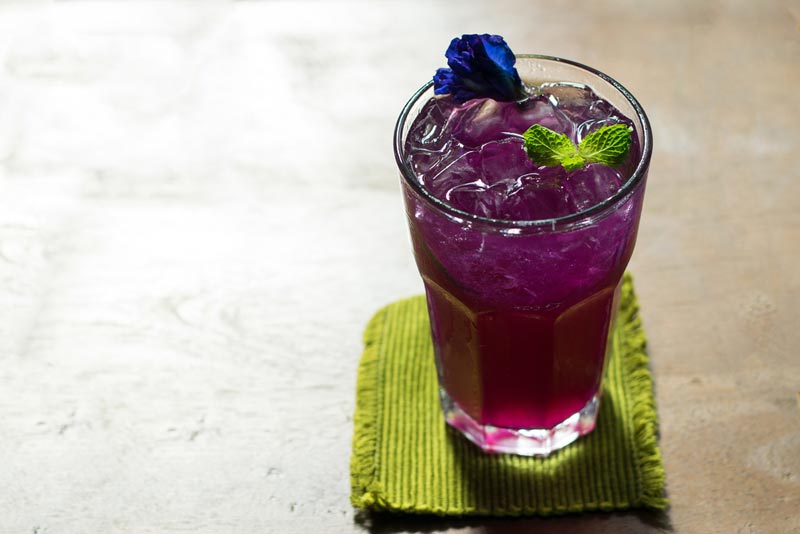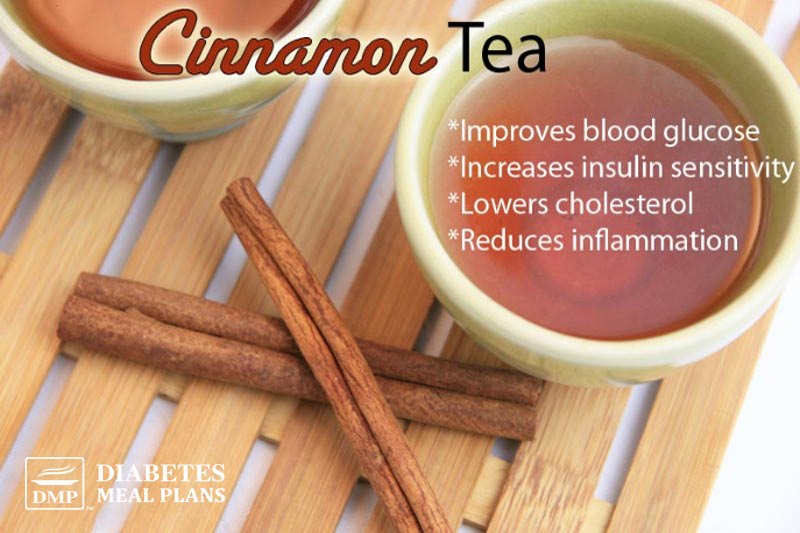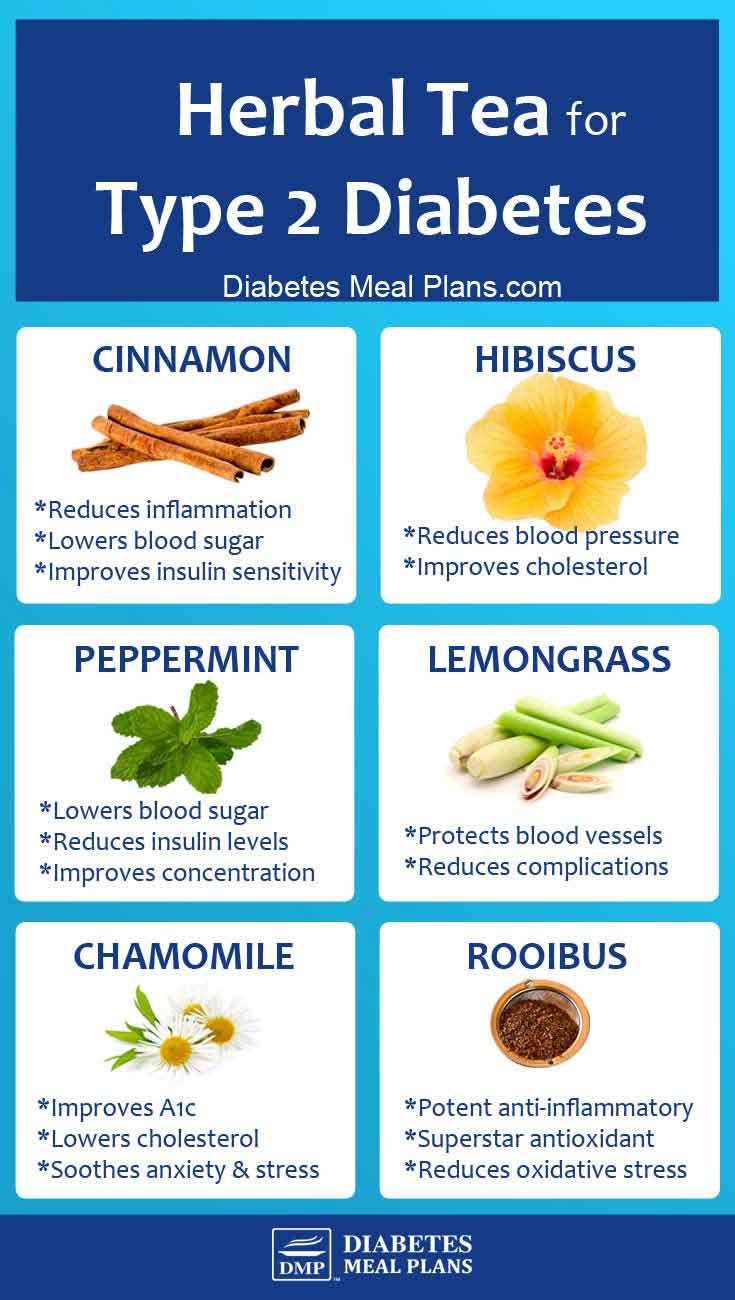There’s nothing quite like sitting down to a cup of hot herbal tea to calm the nerves and soothe the belly.
But more than that, the many health benefits herbal tea provides is one very compelling reason you should include herbal tea in your everyday diabetes routine!
It’s no accident that herbal tea beverages can make us feel so good. Steeping medicinal infusions is one of the oldest practiced medicines in existence. It hails from Ancient Egypt to Ancient China to many other parts of the globe.
And once you learn about the benefits they can bring, you’ll be using them more than ever!

What is Herbal Tea?
Unlike black and green tea, herbal tea is not derived from the Camellia sinensis plant. For this reason, it does not contain caffeine (in most cases) and is not technically considered tea; it’s more of an infusion or blend. Still, most people obviously just call them herbal teas!
And of course, just like black tea or green tea (which we have discussed the benefits of previously), herbal tea is made by steeping a tea bag or dried tea “leaves” (which can actually come from dried leaves, flowers, or roots of the plant) in boiling water.
Sarah Outlaw, Clinical Herbalist, informs us that while herbal remedies are more potent in tinctures and powder form (often found in supplements), if you use loose herbs in teas in larger quantities and steep them longer, you can also enjoy their incredible medicinal benefits.
Common varieties of herbal teas include chamomile, hibiscus, peppermint, rooibos, and maté. But there are so many types out there that it would be extremely difficult to try them all (or include them in this article!).
Herbal Tea Nutrition Facts
Most herbal teas do not contain any fats, protein, or fiber. Most varieties also contain zero carbohydrates.
Though be warned, sugar-sweetened teas can get you into trouble and you should steer clear of them.
For instance, an unsweetened rooibus tea contains zero calories and carbs, while a sweetened orange vanilla rooibos tea contains 70 calories and 20 grams of carbs – all of which is sugar!
Drink that and your blood sugar levels won’t be happy. But your non sweetened varieties are a great inclusion in your diet!
And, they can be a fantastic tool for fooling your tastebuds that they’re tasting something sweet. This is because spices and flavors like licorice, cinnamon, star anise, and others can provide you with a pleasant, sweet-tasting flavor without any actual sugar – bonus!
Iced Herbal Teas
There are some fantastic herbals that are readily available in the store, such as blackcurrent, raspberry, ginger, lime, lemon, apple, pear, peach, and so forth – all of which are low in sugar but have a naturally sweet flavor.
Steep a strong concoction in a jug, keep in the fridge and drink as desired, over ice if you prefer your drinks extra cold.

If you do want a touch of sweetness, try adding a few drops of liquid stevia extract.
A Closer Look at Herbal Teas and Type 2 Diabetes/ Prediabetes
Cinnamon tea
According to research in animals, natural phytochemicals in cinnamon are able to modulate liver enzymes and suppress the activity of genes that promote inflammation, fat storage, and oxidative stress – all of which is beneficial to diabetes treatment.
The antioxidant and anti-inflammatory properties of cinnamon are also thought to have a positive effect on blood sugar regulation and insulin sensitivity, which has the potential to influence various aspects of metabolism – improve insulin resistance, blood pressure, cholesterol and weight.
Best of all, cinnamon tea has a wonderfully natural sweet flavor. Try making our cinnamon tea recipe.

Chamomile tea
When researchers gave people with type 2 diabetes chamomile tea immediately after meals 3 times per day for 8 weeks, they found their A1c, insulin levels, triglycerides, LDL (‘bad’) cholesterol, and overall cholesterol levels improved.
Chamomile tea has been found to improve glycemic control and lower insulin resistance, triglycerides, LDL (‘bad’) cholesterol, and overall cholesterol in people with type 2 diabetes. Chamomile tea has also been shown to improve antioxidant status in people with type 2 diabetes.
Chamomile tea is also known to soothe IBS and stomach ulcers, ease nausea, relieve allergy symptoms, ward off anxiety and tension, provide headache relief, and can even be used as a disinfectant for wounds.
Peppermint tea
Animal research has shown that consumption of peppermint tea for 4 weeks may lower blood glucose levels by up to 25% and reduce insulin levels by as much as 75%, protecting the pancreatic cells from overworking. Peppermint may also help control cholesterol levels, particularly LDL.
Peppermint tea is also known to help induce sleep, improve concentration, can soothe stomach problems and reflux, and can help relieve stress.
Rooibos tea

Rooibos tea is a superstar when it comes to decreasing inflammation and oxidative stress – which is very important for everyone, but even more so for diabetics and prediabetic!
Like green tea, rooibos contains high levels of flavonoids and polyphenols (209.1 ug/mg total compounds), coming in just above the content found in green tea (200.8 ug/mg).
This South African-derived tea can help prevent DNA damage and inflammation through its antioxidant properties, and these properties are very potent – it’s even been shown to prevent the onset of cancer, as well as halting its progression!
If you’ve never tried rooibus tea, it’s very similar to regular caffeinated tea without the caffiene. Drink it in the same fashion, with a little milk and your chosen sweetener.
Lemongrass tea
Delicious lemon grass tea has antioxidant properties that can help protect endothelial cells (the cells that line blood vessels) from the oxidative damage that can result from high blood sugar.
This action may provide some protection in preventing diabetic complications.
Please pin, tweet or share, then keep reading.

Hibiscus tea
Hibiscus tea (also referred to as sour tea) is a particularly interesting tea with known benefits for assisting with high blood pressure control in people with type 2 diabetes.
- It’s been shown to reduce blood pressure by an average 21.7 mmHg after consuming it for just one month.
- A review of clinical trials also confirms it’s positive influence on reducing both systolic and diastolic blood pressure.
Hibiscus tea has also been found to have positive effects on insulin resistance, as well as helping to increase HDL “good” cholesterol levels.
Maté tea
Mate, also known as erva mate and chimarrão or yerba mate and cimarrón, is a traditional beverage of South America. However, be warned, this is a caffiene-heavy beverage not suited to everyone’s metabolism.
Still, it has been shown to have some benefits.
When people with type 2 diabetes and prediabetes were given Maté tea 3 times per day for 60 days, those with type 2 diabetes saw their fasting blood sugar decreased by 25 mg/dL (1.4 mmol/l), A1c reduced by 0.85%, and with positive effects on cholesterol levels as well. Those with prediabetes did not experience the same positive outcomes on blood sugar and A1c, but it did help lower high cholesterol levels and improve their nutrient consumption.
Maté tea has also been found to significantly improve lipid levels and glycemic control in type 2 diabetics.
Licorice tea
The liver is an often overlooked organ in diabetes, yet it plays many important roles in metabolic health.
Licorice contains various compounds, which have potential to improve liver metabolism and maintain the integrity of liver tissue. A compound know as glabridin in licorice has been shown to have blood-sugar lowering properties, in animal studies.
Herbal Tea and Diabetes Conclusion
If you were to evaluate the benefits of most medicinal plants, you could no doubt find a benefit for your health.
As you can see, the world of herbal tea is truly a wonderland that never stops handing out surprises when it comes to health benefits, and adding them to your regular routine can only help with better diabetes control.
Best of all, herbals are plant-derived – meaning they are natural. And being that herbal teas aren’t as potent as herbal remedies, they are generally considered safe.
And without a doubt, an iced herbal tea can make a fantastic cold healthy diabetic drink that hits the spot on those hot steamy days. ;)
Enjoy!


Dear Jedha,
My husband has been dealing for the past 3yrs with diabetes type 2, he’s taking metformin and insulin shots… if he decided to try any of this herbal teas, is that can be a contradiction with his current treatment? If not how that works.
Thanks,
Carmen
Being that your husband is on insulin, it is especially important that he inform his doctor if he plans to start including tea regularly in his diet. While it might not seem like adding tea is a huge diet change, it is possibly that the herbal tea alters the amount of insulin he needs and if he is not being closely monitored by his doctor then it has the potential to result in a hypoglycemic event.